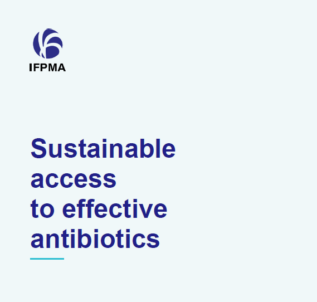Sustainable access to effective antibiotics

The UN High-Level Meeting (HLM) on Antimicrobial Resistance (AMR) in September 2024 will draw much-needed global attention to this pressing global health threat, offering an opportunity for meaningful progress at all levels. To achieve this, leaders need to agree to an ambitious and impactful set of commitments against AMR, consider how best to address evidence gaps, and build structures to track progress. In this context, ensuring access to effective antibiotics is a key public health priority – now and in the future.
In this position paper, we explore some of the challenges in ensuring access to safe and quality-assured antibiotics and propose a set of policy changes for consideration.
Challenges in ensuring access to safe and quality-assured antibiotics – both existing and new – include:
- Weak health systems and challenges in implementing comprehensive Universal Health Coverage (UHC), leading to limited healthcare infrastructure to appropriately diagnose infections, dispense appropriately, and deliver antibiotics efficiently to patients.
- Inefficient regulatory procedures and differing requirements between countries, with weak regulatory capacity and supply chain surveillance, resulting in delays in regulatory approval and the circulation of substandard and falsified medicines.
- Insufficient disease surveillance and demand forecasting/planning over a longer term, contributing to inappropriate use and preventing timely and robust demand signaling to suppliers.
- The lack of public reimbursement lists or donor-funded procurement for essential antibiotics, and procurement policies that do not appropriately recognize the value of antibiotics to the healthcare system and to societies.
- A weak clinical development pipeline due to slow progress on new financial incentives at a national and/or regional level that would address the market challenges for new antibiotics by rewarding innovation, thus encouraging greater investment to build a resilient and sustainable pipeline and base of R&D expertise.
Recommendation for action
Improving sustainable access to antibiotics will require a broad set of measures, tailored to individual context – both in terms of products and geographies:
- Leveraging principles of regulatory harmonization and reliance in order to facilitate product approval and introduction.
- Improved surveillance and forecasting to better inform antibiotic demand.
- Reimbursement reform that recognizes the broad value of antibiotics which can include access-supporting subscription models that countries beyond G7 (including G20) could be well positioned to explore.
- Sustainable tendering policies for off-patent antibiotics that involve multiple suppliers in the procurement process.
- Procurement mechanisms that pool demand could support access in lower income settings, as could new partnership agreements between developers, global health agencies and/or appropriate commercial partners.
Implementing effective pull incentives in G7 and the EU and an overall sustainable market that supports antibiotic launches will not only revitalize private investment in R&D but are necessary reforms to safeguard current and future global public health.
- Global dynamics and sources of AMR burden need to be considered as an important factor in the R&D of new antibiotics. Globally relevant R&D targets jointly determined by all stakeholders involved in AMR, including the industry, can in turn support incentive implementation efforts in a way that considers the needs of all countries.
The pharmaceutical industry is committed to playing its part in increasing access to antibiotics by working with relevant partners and stakeholders to make feasible and economically sustainable changes to ensure that all patients can access the essential antibiotics they need, including broad and timely access to new antibiotics around the world.


